Posted on February 28, 2012 by The Orwell Prize -

Bringing you the story that Scottish journalists seem unable to do. Taken from Rangers Tax-Case
Submitted posts
- What is Rangers’ tax case all about? – Rangers Tax Case, 28/03/11
- Lies, damned lies, and Scottish football journalism – Rangers Tax Case, 29/03/11
- The Other Rangers Tax Case – Rangers Tax Case, 01/04/11
- Alastair Johnston Confirms The RangersTaxCase Truth – Rangers Tax Case, 02/04/11
- Rangers’ Expert Advice – Rangers Tax Case, 04/04/11
- Rangers Knew About Other Tax Bill – Rangers Tax Case, 06/04/11
- Making sense of nonsense – Rangers Tax Case, 26/04/11
- The deceptive Craig Whyte – Rangers Tax Case, 25/05/11
- Credit Where Credit Is Due – Rangers Tax Case, 14/08/11
- Martin Bain, His lawyers, Rangers & Insolvency – Rangers Tax Case, 10/09/11
Posted on February 28, 2012 by The Orwell Prize -
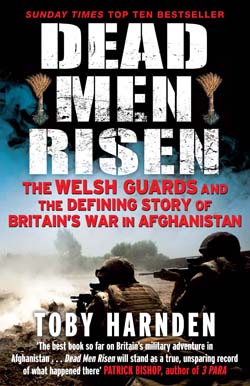
This is the gripping story of the men of the Welsh Guards and their bloody battle for survival in Afghanistan in 2009. Underequipped and overstretched, they found themselves in the most intense fighting the British had experienced in a generation. They were led into battle by Lieutenant Colonel Rupert Thorneloe, a passionate believer in the justness of the war who was deeply dismayed by the way it was being resourced and conducted. Thorneloe was killed by an IED during Operation Panther’s Claw, the biggest operation mounted by the British in Helmand.
Dead Men Risen draws on secret documents written by Thorneloe, which raise questions from beyond the grave that will unnerve politicians and generals alike. The Welsh Guards also lost Major Sean Birchall, commanding officer of IX Company, and Lieutenant Mark Evison, a platoon commander whose candid personal diary was unnervingly prophetic. Not since the Korean War had a single British battalion lost officers at the three key levels of leadership.
Harnden transports the reader into the heart of a conflict in which a soldier has to be prepared to kill and die, to ward off paralysing fear and watch comrades perish in agony. Given unprecedented access to the Welsh Guards, Harnden conducted hundreds of interviews in Afghanistan, England and Wales. He weaves the experiences of the guardsmen and the loved ones they left behind into a seamless and unsparing narrative that sits alongside a piercing analysis of the political and military strategy. No other book about modern warfare succeeds on so many levels.
Taken from Quercus
Judges of the 2012 Book Prize, Helena Kennedy, Miranda Carter and Sameer Rahim, said; ‘It sometimes seems that we only care about the soldiers fighting in our names when they are killed. Once the platitudes are over we forget about them. Toby Harnden’s remarkable book takes us into the hearts and minds of the Welsh Guards in a way that is both compelling and visceral. It challenges every citizen of this country to examine exactly what we’re asking soldiers to do in Afghanistan. And rather than offering easy answers it lets the soldiers speak for themselves.’
Posted on March 30, 2011 by The Orwell Prize -

To follow.
Posted on March 30, 2011 by The Orwell Prize -
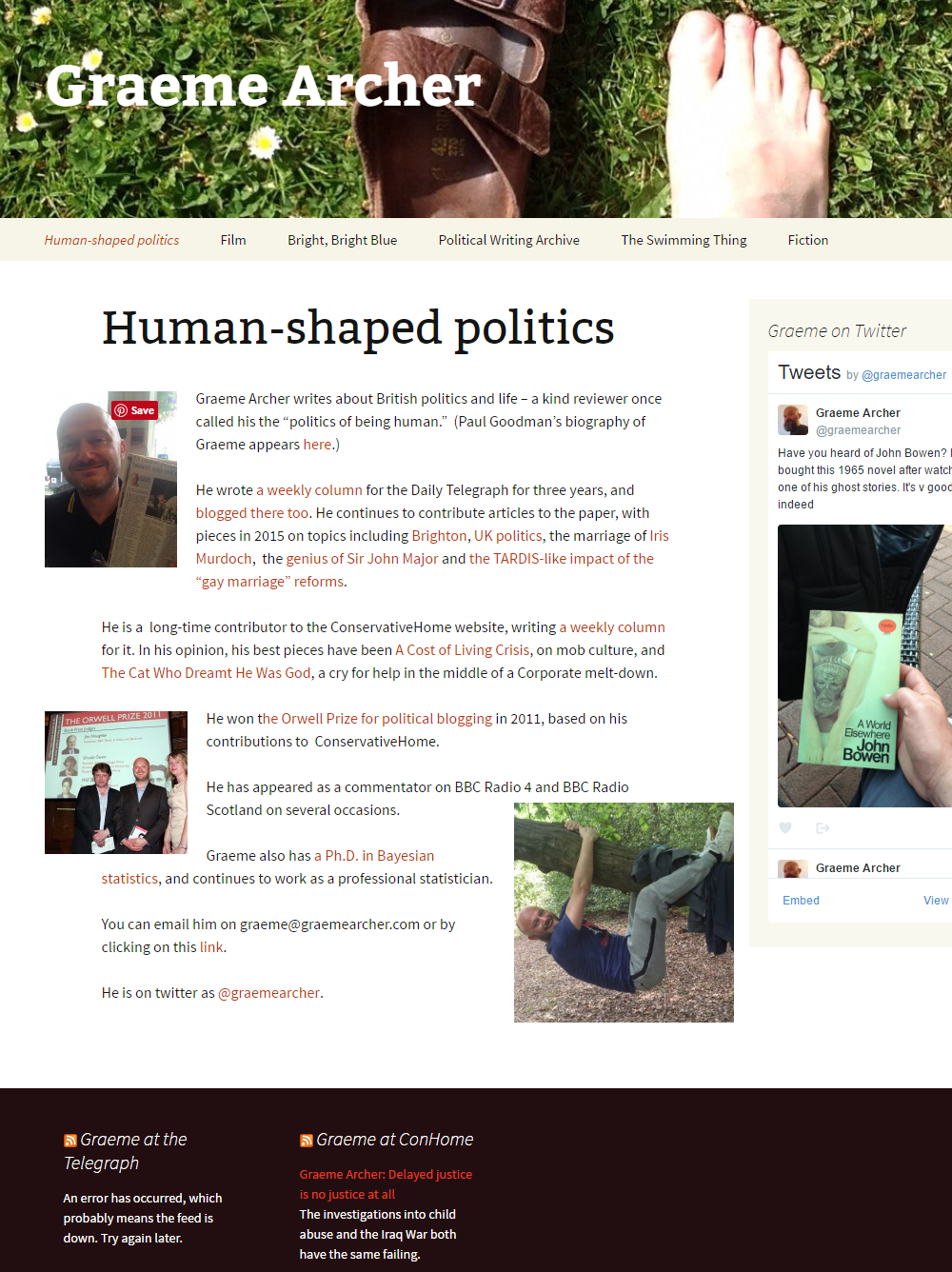
Graeme Archer is a 41 year old, civilly-partnered vegetarian Tory who lives in Hackney & is mildly obsessed with swimming. He writes on the ConservativeHome website, about Tory politics and London life mainly. The biggest influences in his life are the novels of Iris Murdoch. And swimming.
Submitted blogposts
- An Open Primary should select a Coalition candidate for Oldham East and Saddleworth – ConservativeHome, 05/11/10
- As Good As It Gets – ConservativeHome, 23/10/10
- Football Crazy, Football Mad – ConservativeHome, 25/11/10
- Gay People and Christians are not enemies – ConservativeHome, 13/08/10
- What Not To Wear – ConservativeHome, 18/07/10
- Random Power – ConservativeHome, 28/01/10
- Someone else’s sigh – ConservativeHome, 13/04/10
- No Poofs – ConservativeHome, 23/03/10
- Breathe In Peace – ConservativeHome, 17/12/10
- Time for some politics of ‘and’? – ConservativeHome, 09/12/10
Other links
My name is Graeme Archer. I’m a member of the Conservative Party approved list of parliamentary candidates.
Posted on March 30, 2011 by The Orwell Prize -
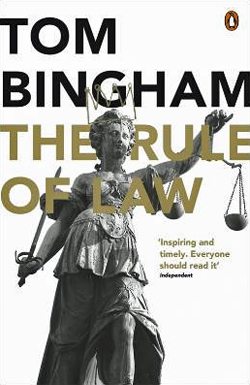
‘The Rule of Law’ is a phrase much used but little examined. The idea of the rule of law as the foundation of modern states and civilisations has recently become even more talismanic than that of democracy, but what does it actually consist of?
In this brilliant short book, Britain’s former senior law lord, and one of the world’s most acute legal minds, examines what the idea actually means. He makes clear that the rule of law is not an arid legal doctrine but is the foundation of a fair and just society, is a guarantee of responsible government, is an important contribution to economic growth and offers the best means yet devised for securing peace and co-operation. He briefly examines the historical origins of the rule, and then advances eight conditions which capture its essence as understood in western democracies today. He also discusses the strains imposed on the rule of law by the threat and experience of international terrorism.
The book will be influential in many different fields and should become a key text for anyone interested in politics, society and the state of our world. Tom Bingham died in September 2010.
Posted on October 17, 2010 by The Orwell Prize -

Gender: Male Occupation: Project Worker/Support Worker Location: Scallysville, Chavshire, United Kingdom
Submitted blogposts
- Children in Care – Winston Smith, 17/02/09
- Living Arrangements – Winston Smith, 25/02/09
- Social dis-services at it again – Winston Smith, 03/03/09
- Crisis Funds – Winston Smith, 25/03/09
- The Deadly Case of Assault with a Can of Deodorant – Winston Smith, 03/04/09
- The Right to be Morbidly Obese – Winston Smith, 11/04/09
- Addicted to Idleness – Winston Smith, 22/05/09
- Just Another Burden on the Welfare State – Winston Smith, 09/07/09
- A Self Sustaining Egalitarian Redistributive Food System – Winston Smith, 12/11/09
- Driving Miss Crazy – Winston Smith, 12/12/09
Other links
Posted on October 17, 2010 by The Orwell Prize -

A Special Prize for Lifetime Achievement was awarded to documentary-maker Norma Percy. Executive producer at Brook Lapping, Percy’s most recent work was Iran and the West for BBC Two, with previous documentaries including The Death of Yugoslavia, The Second Russian Revolution, Israel and the Arabs: Elusive Peace, Endgame in Ireland and Watergate. She was awarded (jointly, with Brian Lapping) the BAFTA Alan Clarke award in 2003 and the RTS Judges award in 1996, and her work has won a number of other major prizes (including an Emmy). She was presented with the Trustees’ Award at the Grierson Awards 2009.
We felt Norma Percy deserved the Prize because of her unflagging commitment, energy and resourcefulness over some three decades of important work that reframed key events in contemporary history by showing the human face of history: that mortals were involved.”
The judges
Special Prize
Other links
Posted on October 15, 2010 by Eric Blair -
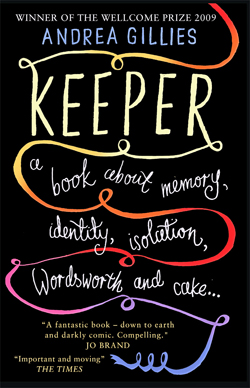
Can our personalities be taken away from us? Are memory and identity mutually dependent? What exactly is the soul? Three years ago, Andrea Gillies, a writer and mother of three, took on the care of her mother-in-law Nancy, who was in the middle stages of Alzheimer’s disease. This newly extended family moved to a big Victorian house on a headland in the far, far north of Scotland, where the author failed to write a novel and Nancy, her disease accelerated by change, began to move out of the rational world and into dementia’s alternative reality.
This book is a journal of life in this wild location, in which Gillies tracks Nancy’s unravelling grasp on everything that we think of as ordinary, and interweaves her own brilliantly cogent investigations into the way Alzheimer’s works. For the family at the centre of this drama, the learning curve was steeper and more interesting than anyone could have imagined.
Winner of the Orwell Prize 2010 and the inaugural Wellcome Prize 2009.
Posted on October 15, 2010 by The Orwell Prize -

Peter Hitchens is a columnist and reporter for the Mail on Sunday, having previously reported from Moscow and Washington for the Daily Express. He has contributed to other publications, such as Prospect and The Guardian, authored documentaries on Channel 4 and the BBC, and appeared elsewhere on radio and television. Peter has also written a number of books, including The Rage Against God, The Cameron Delusion, The Broken Compass, The Abolition of Britain, The Abolition of Liberty and A Brief History of Crime.
Submitted articles
Other links
Posted on October 20, 2009 by The Orwell Prize -
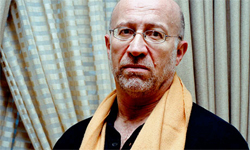
A Special Prize for Lifetime Achievement was awarded to Tony Judt, whose book Reappraisals (William Heinemann) had been shortlisted for the Book Prize.
Although sometimes overshadowed by fiction and poetry, history and the essay are just as much branches of literature, and indeed of ‘creative writing’, and they have produced much of the best writing of our age. Even in a rich field of brilliant historians, the name of Tony Judt stands out. From his first scholarly work on socialism in nineteenth-century Provence he came nearer home with his learned but also coruscating Past Imperfect: French Intellectuals, 1944-1956, describing the “self-imposed moral amnesia” of those intellectuals, and then the crowning achievement of his magnum opus, Postwar.
But like other great historians before him he has also engaged in public debate, becoming a politicologue – a word for which we need an equivalent – and controversialist, whose essays, largely in the New York Review of Books, have been distinguished by their intelligence, insight and conspicuous courage. His collection of these essays, Reappraisals, was a strong contender for this year’s Book Prize, but the judges felt that Judt’s work as a whole deserved special recognition. If there is – in the best sense – an ‘Orwellian’ writer in our time, it’s Tony Judt, and it is an honour to bestow honour upon him.
The judges
Special Prize
Other links
Posted on October 18, 2009 by The Orwell Prize -

The blog of a pseudonymous English detective. After winning the first-ever Orwell Prize for Blogs, Night Jack was revealed to be Richard Horton by The Times following a landmark High Court ruling, The Author of a Blog vs Times Newspapers Limited.
Submitted blogposts
All posts via The Salted Slug’s, Nightjack Archive.
Other links
Posted on October 17, 2009 by Eric Blair -

From the 1960s to the 1980s, Sweden was an affluent, egalitarian country envied around the world. Refugees were welcomed, even misfit young Englishmen could find a place there.
Andrew Brown spent part of his childhood in Sweden during the 1960s. In the 1970s he married a Swedish woman and worked in a timber mill while helping to raise their small son. Fishing became his passion and his escape. In the mid-1980s his marriage and the country fell apart. The Prime Minister was assassinated. The welfare system crumbled along with the industries that had supported it. Twenty years later, Andrew Brown travelled the length of Sweden in search of the country he had loved, and then hated, and now found he loved again.
Posted on October 17, 2009 by The Orwell Prize -
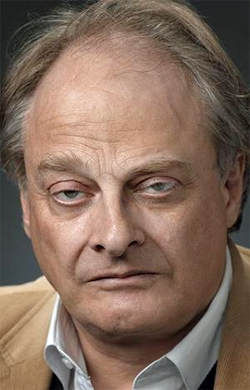
Awarded the Orwell Prize for work published by the London Review of Books and The Independent. Patrick Cockburn was born in Cork in 1950. He divides his time between London and Iraq and is one of the very few Western journalists who still travel outside the Green Zone in Baghdad without an armed escort. He is a foreign correspondent for The Independent and has worked in Moscow, Washington, Jerusalem, Belfast, Beirut and Baghdad. His books include The Occupation, The Broken Boy, and Muqtada al-Sadr and the Fall of Iraq, and he was the recipient of the Martha Gellhorn Award in 2005 and the James Cameron Award in 2006.
Submitted articles
Other links
Posted on October 20, 2008 by The Orwell Prize -

Clive James was awarded a Special Prize for Writing and Broadcasting after being shortlisted for the Journalism Prize 2008 (for three editions of A Point of View on BBC Radio 4).
He has been a staple of British screens, airwaves and publications since the early 1970s. A writer, poet, essayist, broadcaster and commentator, he has written for The Listener, the New Statesman, the Review, The Observer, The Guardian, the LRB, The Spectator and the Times Literary Supplement. He has presented (and created) television programmes including Fame in the 20th Century, Clive James’ Postcard from… and Clive James on Television.
Clive James is a master, in the Orwell tradition, of the essay. Whether written or broadcast his words are sharp but humane.
Professor Jean Seaton
Chair of the Orwell Prize
Other links
Posted on October 18, 2008 by Eric Blair -
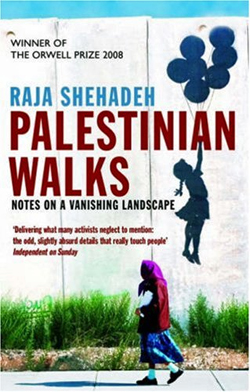
Palestine is a land of biblical beauty – of olive groves, grapevines, stone buildings, rolling hills, wadis and cliffs. It is also a land of violence and war. Human rights lawyer and writer Raja Shehadeh has lived on the West Bank since his family fled Jaffa in 1948. A peace activist of independent temper, he has seen at first hand the horrors of occupation – including the siege of Ramallah. For decades Raja has found comfort in walking, following what in Arab culture is called sarha – meaning to roam freely, at will, without restraint: to go where the spirit takes you.
In Palestinian Walks he invites the reader to come along for the unique experience of a sarha in Palestine. The six walks that comprise the book span a period of twenty six years evoking the land, its history and some of Palestinian’s political struggles, disappointments and hope. Palestinian Walks describes a vanishing landscape. Raja takes us to beautiful hills, past rivers and sacred springs, to famous landmarks from A’yn Qenya, the Shukba Caves, from Wadi Qelt to the Dead Sea (now receding by a metre every year thanks to Israel’s diversion of the river Jordan, an environmental catastrophe in the making).
We take a walk with Selma Hasan, a PLO functionary from Tunis, who returned after the Oslo Accords (a settlement that undermined decades of Raja’s legal work on land rights). And we experience the everyday humiliations and harassment by Israeli soldiers – including a chance meeting with a settler who lives next to Raja’s hometown. But there are also moments of extraordinary beauty:
To my left at the perfectly still waters of the [Dead] Sea, transformed by the sun into a luminous platinum sheet, and to my right at the formidable wall of incandescent rock along which we were travelling, towering steeply, challengingly, seemingly an impenetrable line of defence, a mighty gateway into another world.
Palestinian Walks shows how Raja’s life, and the fate of the landscape are utterly intertwined. It is an intensely personal account of life in one of the world’s most troubled regions, and a poignant story of how a pleasure so many of us take for granted – the freedom to roam through the countryside – is being destroyed.
Posted on October 18, 2008 by The Orwell Prize -
The Orwell Prize for Journalism 2008 was awarded to Johann Hari, but returned on 14 September 2011.
Posted on October 20, 2007 by The Orwell Prize -

At the ceremony for the Orwell Prize 2007, a Special Prize was awarded to Newsnight, BBC2’s flagship current affairs programme.
When we were discussing the many very fine pieces of journalism that were submitted Newsnight just spontaneously emerged in our deliberations as the most precious and authoritative home for proper reporting of important stories, beautifully and intelligently crafted by journalists of rare distinction.
We unanimously believed that its values of objective intelligent news ought to be rewarded. We did not set out to award this prize – it plays a role in the collective intelligence of the nation.
The judges
Special Prize
When Newsnight won the Orwell Prize in 2007 we felt honoured for two reasons. First, this was not a competition we had entered – the judges had simply decided that the work we do on Newsnight deserved recognition. And second, we were delighted to be associated with a prize which seeks to celebrate the principles of Orwell’s journalism – to make politics and political thought accessible and artful.
Peter Barron
Newsnight editor
Other links
Posted on October 19, 2007 by The Orwell Prize -
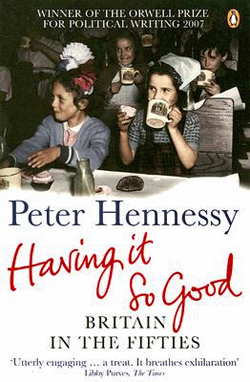
Having It So Good evokes Britain emerging from the shadow of war and the privations of austerity and rationing into growing affluence. Peter Hennessy takes his readers into the front-rooms where the Coronation was watched on television, to the classrooms and now coffee bars of 1950s Britain – and also into the secret Cabinet rooms in which decisions about the British nuclear bomb were taken and plans made for the catastrophe of nuclear war. He brings to life the ageing Churchill, in his last faltering spell as Prime Minister, the highly-strung Anthony Eden taking his country to war in the teeth of American opposition and world opinion, and the rise of ‘Supermac’ Harold Macmillan, gliding over problems with his Edwardian insouciance.
Above all, Having It So Good captures the smell and the flavour of an extraordinary decade in which affluence and anxiety combined to produce their own winds of change.
The judges said:
A marvellous history which seamlessly places high, intimate political history of the 50s, nuclear planning, Suez, and its characters in the context of British holidays and ice-cream. It re-invents history, all exuberantly done in Peter’s inimitable voice.
















